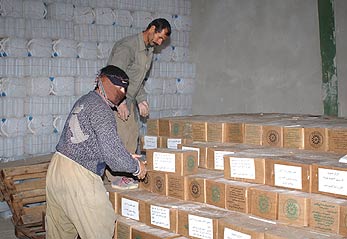First, small group of Iraqi refugees arrives in Syria; all quiet on other fronts
First, small group of Iraqi refugees arrives in Syria; all quiet on other fronts

AMMAN, Jordan, March 24 (UNHCR) - Fighting in north-western Iraq has driven a first group of 14 Iraqi refugees into Syria over the weekend. While no other refugee arrivals have been reported in other countries bordering Iraq, the UN refugee agency and regional governments continue to prepare for a possible refugee influx.
On Sunday, the 14 Iraqis - the first refugees from Iraq since fighting began last week - entered Syria through the Al Yarubiyah border crossing point to escape fighting in Mosul, Iraq. They were taken to an existing refugee camp at El Hol, about 100 km from Al Yarubiyah.
In preparation for possible refugees from Mosul and Kirkuk in northern Iraq, the Syrian authorities have agreed to set up a camp at the Al Yarubiyah border crossing, and another one at Al Tanf. Work on the newly-approved camps will start this week.
No additional refugees have been reported in the other neighbouring countries, although some third-country nationals of Morocco, Tunisia, Yemen and Somalia have arrived in Syria and Jordan.
Despite reports of population displacement in northern Iraq, Iraqis seem to be sticking close to their communities and have so far not approached the frontier.
UNHCR has sent more mobile teams to monitor the borders with Iraq in order to respond to any developments that may arise. In Syria, there are now two teams checking the border crossings at Al Yarubiyah and Al Tanf. In Turkey, three teams have been scanning the border with northern Iraq, including the Uludere crossing, the main entry point for refugees in the aftermath of the 1991 Gulf War.
At Jordan's Al Karama border crossing, UNHCR staff have been chasing up on rumours of new population movements, but there have been no refugees so far. Iran's border with Iraq has also been quiet.
In terms of camp preparations, Syria's El Hol camp currently has emergency relief supplies for 5,000 people. Jordan's Ruwaished camp can now host up to 2,000 people. In Iran, four out of the government's 10 planned sites are currently under construction, with a capacity of up to 60,000 people.
UNHCR recently provided $1 million to Iran and more than $1.2 million to Jordan to help the governments ready themselves for a possible refugee influx.
Where relief supplies are concerned, UNHCR in Turkey has sent eight trucks carrying 8,000 mattresses to the border site of Silopi from its warehouse in Iskenderun. The stockpile at Iskenderun, which can also be shifted into Syria, includes 60,000 blankets, 9,000 tents, 18,000 kitchen sets, 44,000 jerry cans, 58,000 mattresses, 15,000 stoves 10,300 plastic rolls, 17,000 lanterns and 11 pre-fabricated warehouses.
UNHCR has two other stockpiles in the region - Aqaba in Jordan, and Kermanshah in Iran.
On Saturday, the UN refugee agency signed an agreement on food supply with the UN World Food Programme and the Turkish Red Crescent Society. This comes soon after UNHCR and the International Federation of Red Cross and Red Crescent Societies agreed last Friday to work together in providing humanitarian relief in the Iraq region.
UNHCR has so far received $25 million out of the $60 million it needs to fund its initial contingency preparations for a planning figure of 600,000 refugees for one month.








